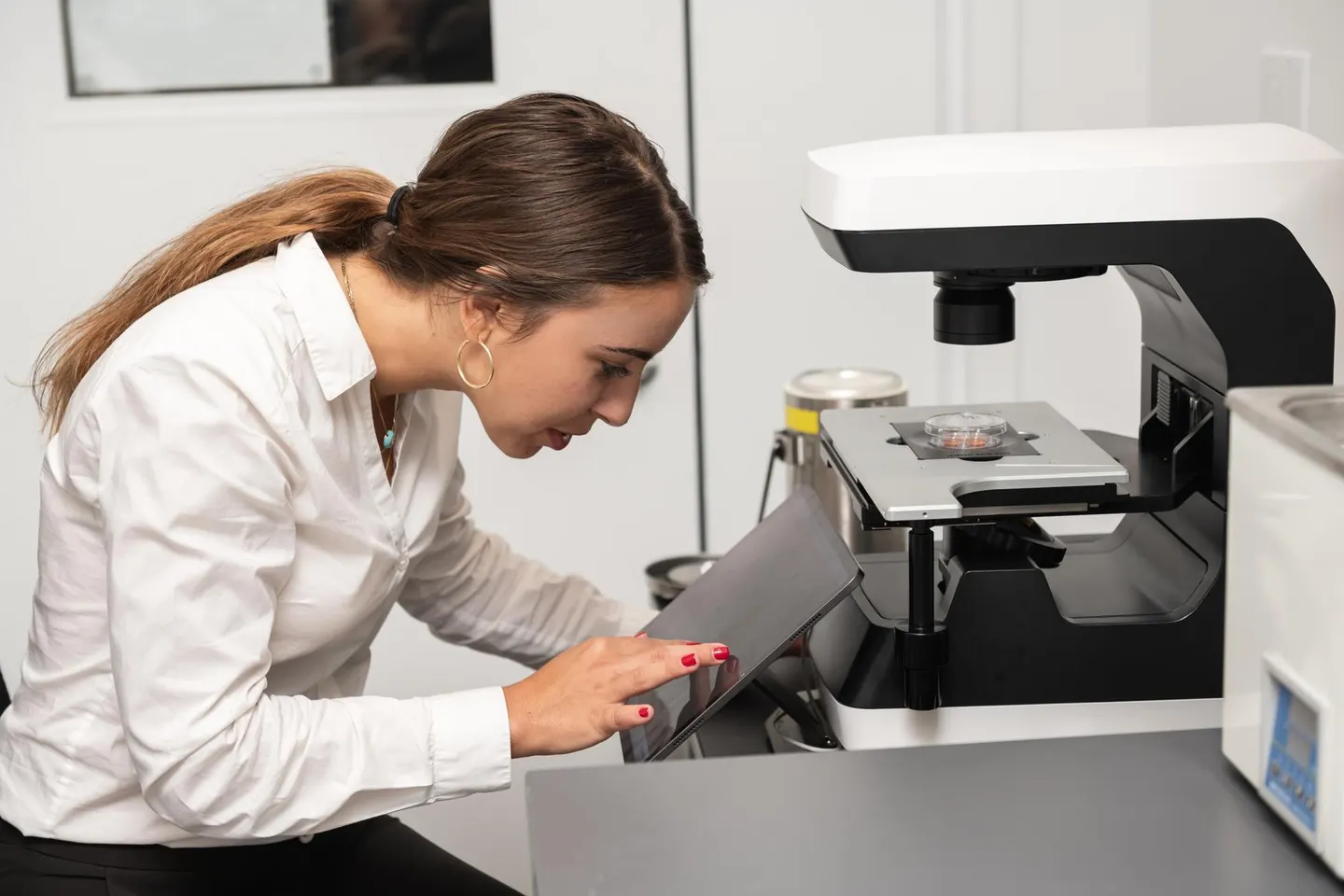
Doctors say IVF technology developed by Gameto, cofounded by Under 30 alumna Dina Radenkovic, has serious potential. Now it’s finally coming to market.
Many founders joke that their companies are like their “baby.” But for Dina Radenkovic, that took on a whole new meaning on December 7 when the first baby conceived using her company’s in-vitro fertilization product, Fertilo, was born in Peru.
“Something that came from a very primitive deck in my first New York rented apartment, to an actual baby, it’s certainly a huge emotional journey,” Radenkovic says of the milestone.
Since 1978, millions of babies have been born using in-vitro fertilization (IVF). Last year in the United States, over 2% of all births utilized the procedure. The way it works is relatively simple: patients inject themselves with hormones for ten to 14 days, sometimes multiple times per day, to mature eggs that doctors can retrieve from the body to freeze or fertilize. Once a mature egg is fertilized, it ideally becomes an embryo that can be re-implanted into the uterus
The process works, but it’s also lengthy, costly and unpleasant. The high doses of hormones often result in side effects like bloating, nausea and vomiting and even ovarian hyperstimulation syndrome, Radenkovic says. What’s more, successful egg extractions only work on the first cycle about half of the time for patients under 35 years old (with success rates decreasing to less than 10% for those over 40), which means that many patients have to undergo multiple physically demanding—and expensive—attempts to complete a successful egg retrieval. This repetition can add up to staggering costs: the typical IVF patient in the U.S. pays between $3,000 and $5,000 per cycle.
These challenges are what inspired Radenkovic to co found Gameto with Martin Varsavsky in 2021. Both had a background in fertility health. Radenkovic, a physician by trade, had worked in clinical and research roles at places like the National Health Services’ Barts Health and St Thomas’. Varsavsky was a multi-time founder—including of Prelude Fertility, North America’s largest chain of fertility clinics.
Gameto’s vision was to make IVF less invasive, less painful and more accessible, the 29-year-old 30 Under 30 Healthcare alumna says. To support the vision, Gameto has raised $73 million in funding—most recently a $33 million Series B led by Two Sigma Ventures that closed this May—to take on the $25 billion global IVF market.
“The market is huge,” says Dusan Perovic, a partner at Two Sigma Ventures, adding that’s largely due to the rising age at which most people want to start families today. “People are starting to realize how much unmet need there is. Investors are starting to realize that, and in order to change some of this we need better technology.”
After founding Gameto, Radenkovic and Varsavsky worked with a lab at Harvard’s Wyss Institute that was researching cell engineering: This led to the insight that it might be possible to mature eggs outside the mother’s body, which could reduce the time and invasiveness of the procedure. “We saw we could leverage that technology to engineer these ovaries in a dish,” Radenkovic says, which led to the creation of their product, Fertilo.
With these new techniques, Radenkovic says that Fertilo can cut the IVF injection process down to just two or three days before extracting non-mature eggs. The eggs are then placed in the dish that acts as a synthetic ovary to mature. This limits the duration and number of injections by nearly 80 percent—and helps mitigate their side effects.
Using Fertilo to reduce hormone injections during the IVF process not only reduces the discomfort, but also reduces the cost and makes it easier for some patients to access IVF, says Dr. Brian Levine, the practice director at CCRM, a fertility clinic in New York.
“Fertilo could help reduce the intrinsic cost of IVF because someone would only take medication for a couple of days,” he says. “If this product could help stimulate someone for just three or four days, that could be all the difference between providing access to care and no access to care,” he adds, because it would be easier to take off work, especially for patients who have to travel for the procedure.
The Gameto team spent years developing the technology with numerous tests to ensure that the eggs and eventual embryos would likely become healthy babies. Clinical trials of the technology have shown positive results, and Fertilo is now approved by regulators in six countries. It’s commercially available in Australia, Mexico, Argentina and Peru, and is currently preparing to enter the market in Japan and Paraguay once it finds clinical partners.
Currently, there are around ten other active pregnancies that utilized Fertilo, including one set of twins. Last week, Gameto announced a partnership with clinic chain IVFAustralia to continue expanding their offerings across that country. Radenkovic says these large-scale partnerships have helped generate some revenue for the startup, though she declined to share how much.
In the U.S., Gameto is currently preparing for Phase 3 clinical trials in the states to begin in 2025, which the company hopes will lead to eventual approval from the FDA. In the meantime, Radenkovic is working to convince the industry that it’s ready for disruption.
“We’ve achieved so much in the past three years, and we’ve been laser focused on execution,” Radenkovic says. “I do believe that great science can be built in great companies. That’s why I went into healthcare, because you can have a positive impact as well as build a great business.”



